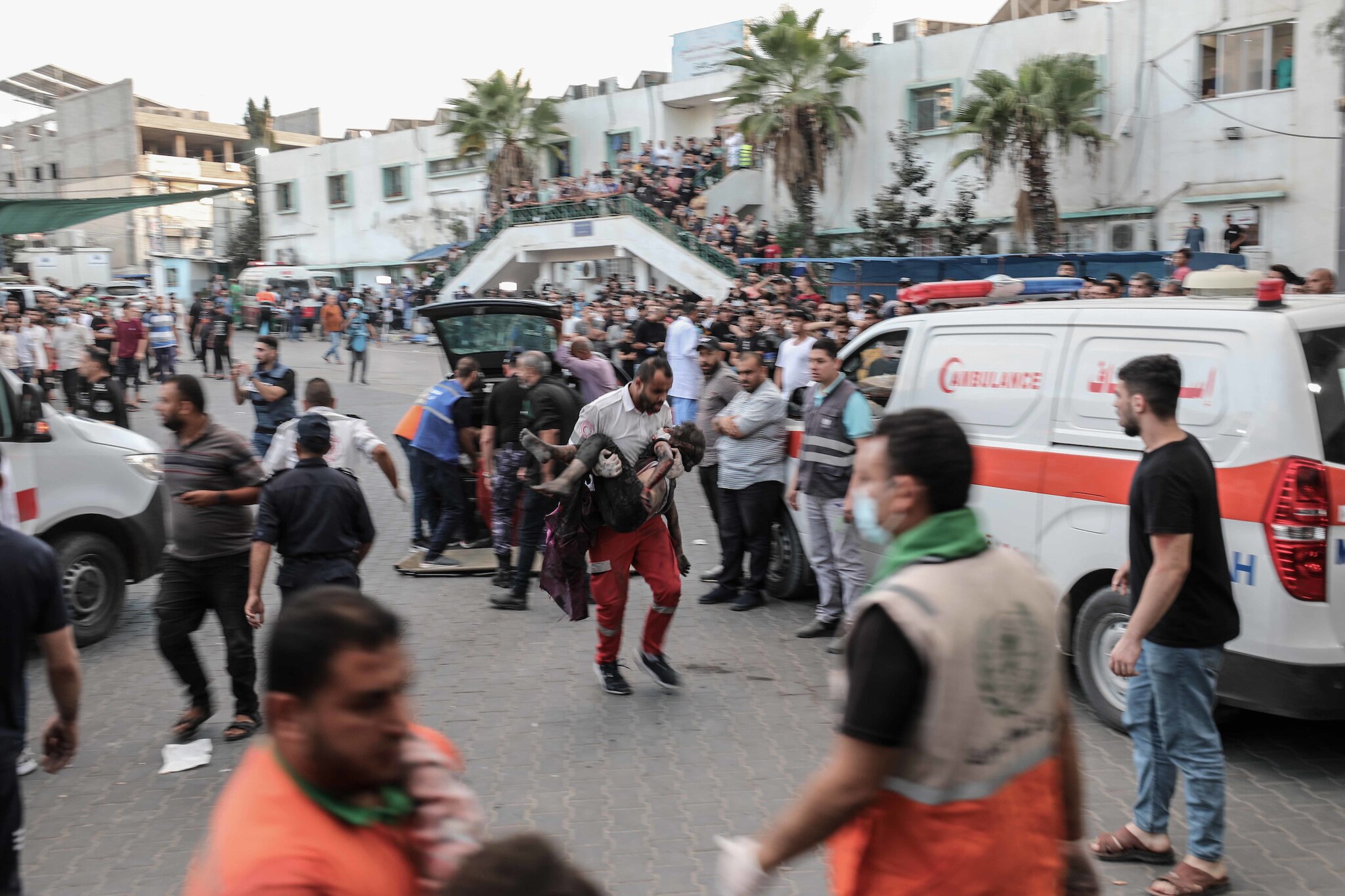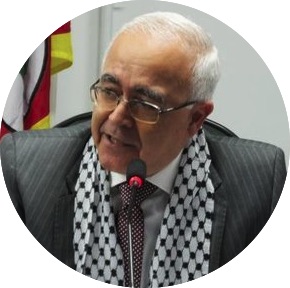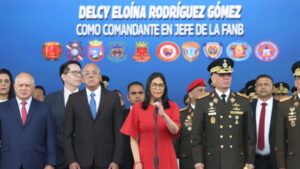
Published 06/12/2024 16:44 | Edited 06/12/2024 17:41
A United Nations inquiry revealed that both Israel and Hamas committed war crimes and serious violations of international law in the early months of the war in Gaza. This report is the agency’s first in-depth investigation into the October 7 attacks and the conflict that followed.
The reports released this Wednesday (12) cover events until the end of 2023 and portray an alarming scenario of both sides routinely ignoring international law in a devastating conflict that has lasted more than eight months. The war not only bitterly divided global opinion, but also increased tensions across the Middle East.
Emir Mourad, secretary general of the Latin American and Caribbean Palestinian Confederation (Coplac), which represents Palestinian communities on the Continent, does not hesitate to state that Israel is weakened and faces a moral, ethical and existential dilemma. In reference to the UN inquiry, he criticizes those who try to balance the conflict as being symmetrical between two military powers, pointing out that this vision is unrealistic and favors an imperialist policy that tries to minimize Israel’s acts, comparing them with the actions of groups of colonial resistance.

“These people who want to balance it as a symmetrical conflict, between two powers at war, live in another world, or practice imperialist politics,” he says. Mourad rejects comparisons that attempt to place the actions of colonial resistance groups on the same level as those of the Israeli state, calling it a “bluff” and a “political maneuver.”
“Look, the facts are the facts, we can’t get away from it. In the International Court, as in the Criminal Court, all actions are against Israel, for the crimes it commits as an occupying State, a colonizing State, which has been committing massacres for decades”, says Mourad, considering this political maneuver as evidence of the UN’s weakness without the Security Council consensus.
October 7 attacks
The United Nations Commission of Inquiry began its report by detailing the events of October 7, when Hamas and other Palestinian armed groups launched a wave of killings and kidnappings in southern Israel, resulting in the deaths of more than 1,200 people, most of them civilians. , and the kidnapping of around 250 hostages. The war crimes cited by the commission include intentional attacks against civilians, murder, torture, inhumane treatment, outrages on personal dignity and the taking of hostages, including children.
The massacres led Israel to declare war on Hamas and launch an attack on Gaza that destroyed much of the densely populated enclave and killed more than 37,000 people, according to Gaza health authorities. In the first two and a half months of the conflict, the commission concluded that Israel committed war crimes as well as crimes against humanity, defined as a widespread and systematic attack against a civilian population. Israel’s alleged war crimes include starvation, arbitrary detention, and the murder and mutilation of “tens of thousands of children.”
Both sides were accused of committing sexual violence and torture, and of intentionally attacking civilians, according to reports spanning more than 200 pages. The commission based its conclusions on interviews with victims and witnesses, forensic analyzes of thousands of open source items, hundreds of documents, satellite images, forensic medical reports and media coverage.
Mourad believes that Israel is weakened and internally torn apart, unable to face any adversary without resorting to its high military technology to attack civilians. He mentions the continued resistance of the Palestinian population and groups such as Hezbollah and other factions in the West Bank and Gaza, which put pressure on Israel both militarily and morally. He highlights that the UN’s condemnations of Israel, when they also include Hamas, are an attempt to maintain the support of the United States, which plays a crucial role in putting pressure on Israel.
According to Mourad, the only nation with real power to influence Israel is the United States. He argues that political and material pressure, especially through American youth and students, can influence American policy and, therefore, Israel’s stance. “Students at universities in the United States have strength, because they pressure Biden and Biden pressures Israel,” he explained.
The recognition of the State of Palestine by more European countries is also an important factor, according to Mourad. He mentions that the number of countries recognizing Palestine has gone from 140 to more than 160, increasing Israel’s isolation and pressuring it to accept a ceasefire.
“The number two force is Europe, so the more countries recognize it, they will add […] This will also have a weight of isolation.” He believes that the combination of international decisions, internal pressure on Israel and ongoing conflicts increase isolation and pressure on Israel to accept a ceasefire. Netanyahu is in a critical situation, where accepting a ceasefire could mean the downfall of his government, while rejecting it increases domestic and international pressure.
Mourad also details the multiple crises facing Israel: economic, military, social, political and moral. “Today there are more than 150 thousand Israeli settlers from the north who lived in the colonies in the north of Israel, which are in the center of Israel. The entire border between Lebanon and Israel is deserted,” he explained. For him, acceptance of a ceasefire is inevitable, despite the internal political dilemma that this would represent for Netanyahu’s government.
International accusations
The new reports add to allegations made by other international bodies. The prosecutor for the International Criminal Court (ICC) last month announced an arrest warrant request for several senior Hamas and Israeli leaders, including Israeli Prime Minister Benjamin Netanyahu, on charges of war crimes and crimes against humanity. . Both Hamas and Israel condemned the accusations. Hamas described the request as an attempt to “equate victims with perpetrators,” while Netanyahu called the petition a “political outrage.”
The report examined Hamas’ actions during the October 7 attacks, describing them as “unprecedented in scale in Israel’s modern history” and evoking the trauma of past persecution for the Jewish people. Hamas militants kidnapped hostages “without regard to age or sex,” some of whom were killed and publicly exposed.
The commission also documented sexual violence and abuse perpetrated by Palestinian and Israeli armed groups and analyzed testimonies of rape collected by journalists and Israeli police, although it was unable to independently verify all allegations due to obstruction by Israel.
The report highlighted the devastating impact of the conflict on Israeli children, many of whom witnessed the deaths of their parents and siblings and were targets of abductions.
Destruction in Gaza
In Israel’s subsequent attack on Hamas, Israeli forces were accused of inflicting “maximum damage” without taking sufficient precautions, resulting in a high death toll, devastating injuries and destruction of civilian infrastructure in Gaza. The commission criticized Israel’s deliberate use of heavy weaponry in densely populated areas, saying it constituted an intentional attack on the civilian population.
The commission urged Israel to immediately establish a ceasefire and called on Hamas to release the hostages. It also demanded that Israel end its sexual abuse practices against Palestinians and allow access for future investigations.
“The only way to stop recurring cycles of violence is to ensure strict adherence to international law,” said Navi Pillay, chair of the commission.
Emir Mourad concludes his statements with a prediction of significant changes in the coming months, marked by intense contradictions and potential escalation of internal tensions in Israel. “The next few days are going to be very hot. And the demonstrations there in Israel have also increased”, concluded Mourad, raising the extreme possibility of a civil war due to the deep internal divisions in an extremely militarized state.
Source: vermelho.org.br

